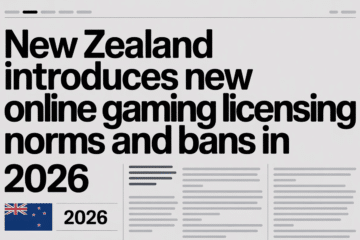Credit Card Restrictions to Prevent Impulsive Online Wagers

Last Updated on July 7, 2025
New measures aim to curb problem gambling in New Zealand’s growing digital betting space. A recent study by the New Zealand Ministry of Health revealed that 1 in 50 adults, or approximately 2.1% of the population, are at moderate or high risk of experiencing gambling-related harm. As online gambling grows rapidly, especially among younger demographics, regulators are turning their attention to financial controls as a tool for harm minimisation.
This article examines the rationale behind New Zealand’s new credit card restrictions on online gambling, how the rules operate in practice, their potential impact on players and the industry, and what individuals in Auckland should consider when engaging with new online casino platforms.
Why the New Credit-Card Rules? A Look at the Policy Shift
In 2024, the Department of Internal Affairs and the Reserve Bank teamed up to limit credit-card use for online-wagering payments. Regulators cited years of evidence showing how easily players can gamble with borrowed cash, a habit linked to deeper debt and serious stress.
Until quite recently, Kiwis could toss their credit cards onto almost any online betting site and start wagering without ever having the actual cash on hand. While this made the sign-up quick, it also normalised reckless gambling and made it far harder for those in trouble to hit the brakes in time. Now New Zealand is tightening up, borrowing a page from Britain, which banned credit-card betting back in 2020.
The move follows growing calls from public health groups and researchers who track gambling harm. A 2023 study by the Problem Gambling Foundation found that nearly 35 per cent of clients coming through its door had used borrowed money to fuel their online play. By stopping credit card payments at the checkout, regulators hope to close one major source of easy cash before it costs households even more.
How Credit Card Restrictions Work on Gambling Transactions
Under the fresh rules, every big Kiwi bank must block credit-card payments tagged as gambling. That mandate covers overseas sites too, which have long slipped through national checks. The ban sweeps over new online casinos, sports-book pages, and any other digital game that uses merchant codes tied to the betting industry.
The new rules put the responsibility squarely on banks and payment providers to spot and stop risky gambling payments as they happen. That duty now stretches to prepaid credit cards and digital wallets linked to credit lines, so no loophole slips through. Because the aim is to curb betting done on borrowed money, though, debit-card purchases still go through unchanged.
Enforcing the ban is still tricky. Many offshore gambling sites hide behind merchant codes that don’t flag them as casinos, so some payments slip past the filters. Even so, stopping late-night bets made on borrowed cash should noticeably cut impulse gambling-especially when people are tired or drinking and judgment fades.
Impact on Players and the Online Casino Industry in Auckland
For at-risk players, losing the credit-card option often slows their urge to bet and makes them think twice. The 2024 Health Promotion Agency Gambling Report backs that up: nearly half the online gamblers asked confessed they chase losses, a pattern that flourishes when credit is just a tap away.
Operators are having to rethink their day-to-day work. Auckland-based affiliates and marketing teams that link up with overseas platforms have reported falling conversion rates since the credit-card block kicked in. In turn, many international gambling firms have reworked their sign-up flows so users now prove how they plan to fund an account before any deposit is allowed.
Locally, regulators say they welcome the added checks, yet they still worry about knock-on effects. For example, some players might simply shift to unregulated sites or start using crypto in order to sidestep the rules and channels that offer no consumer safeguards and may expose gamblers to even bigger harms.
Smaller operators and so-called white-label casinos feel the squeeze the most because they depend on fast sign-ups and steady cash flow. The new limit pushes up the cost of getting into and staying in the New Zealand market, and Auckland, still the hub of online betting, has become an even tougher battleground.
Navigating New Online Casinos: What Players Should Know
Over the past two years, a fresh wave of online casinos aimed at New Zealand players has flooded the web, mostly because offshore operators see the local setup as lightly regulated. Many of these sites are registered in Malta, Curacao, or the Isle of Man, boast large game collections, and work hard to market directly to Kiwi gamblers using geo-targeted ads.
Anyone thinking about signing up with one of these newer platforms should keep a few important points in mind now that New Zealand’s rules are tightening. First, while the sites might still accept debit cards and a range of e-wallets, credit card payments are in practice blocked for most local players. Even casinos that technically allow them will see most Kiwi-issued credit cards decline once the customer hits the pay button.
Second, because there is no single, central licence for overseas gambling, each fresh casino may follow different consumer protection rules, and those gaps can show up when there is a dispute, a payout delay, or questions about how fair the games really are. Auckland players using these services should always double-check any operator’s licence details and read the terms of service to make sure they are not stepping into a risky situation.
Finally, players should keep an eye on their bank statements and, whenever possible, set clear deposit caps. While blocking credit cards cuts out one tempting route, fresh websites and alternative payment options pop up all the time, so smart habits still matter. Features like bank-set spending limits or simple budget-tracking apps act as handy backup shields for anyone exploring this fast-changing scene.


